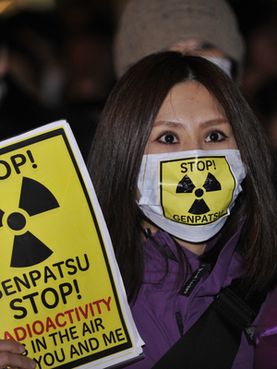 Here's the latest in Sustainability and Climate Change. If there’s anything you’d like to share, leave your comments below!
Here's the latest in Sustainability and Climate Change. If there’s anything you’d like to share, leave your comments below!
- We’ve all heard a lot regarding the Japan earthquake and Pacific tsunami, but now you may get to see some of the results firsthand. The United States can expect to see debris from the Tsunami washing onto its shores, first in Hawaii and then across the West Coast, in the next few years. Meanwhile, the nuclear disaster has now been designated a 7 on the international scale used to rate the seriousness of nuclear incidents – the highest possible rating. New estimates predict that 10,000 terabecquerels of radiation per hour were spewed into the environment within the first few hours of the Fukushima accident, placing it second to only the Chernobyl nuclear disaster. While the current level of emissions has dropped to less than 1 terabecquerel per hour, the effects (especially on our seafood) may already be present. I guess we’ll just have to wait and see what effects this radioactive dump will have on our marine ecosystem as the story unfolds.
- Back on this side of the pond, we’re facing our own energy issues. We all know that America uses a disproportionately large amount of power, but we’re now finding out that some of it goes to surprising places. A recent study concluded that America’s indoor marijuana growers consume enough electricity to power 2 million of the United States’ average sized homes. Electricity consumption by marijuana growers equals approximately 1% of U.S. electricity use, and produces greenhouse gases equivalent to three million cars on the road.
- President Obama announced his energy plan, which calls for a one-third reduction in oil imports by 2025 and for 80% of electricity to come from “clean” sources by 2035. That grouping would include nuclear, natural gas and clean coal, however, which is drawing the ire of many environmental groups. Senate Minority Leader Mitch McConnell (R-KY) agrees with encouraging more domestic energy production, but criticized the cancelling of drilling leases in the Gulf of Mexico. As the one year anniversary of the Gulf Oil Spill draws near, we should not forget its legacy on the ecosystem (PHOTOS); the Gulf’s inhabitants certainly can’t forget.
- In the wake of the budget standoff that nearly shut down the government early this month, there’s relief for the Environmental Protection Agency. During the White House talks between President Obama, Speaker of the House John Boehner and Senate Majority Leader Harry Reid, it was agreed that the final budget measure would not include controversial restrictions on the EPA that would stop the agency from regulating greenhouse gases. What did get cut? $700 million from clean and safe drinking water programs, $82 million to help states comply with new climate regulations and air pollution measures, and the entire program that currently tracks climate trends and provides information to lawmakers.
- In other energy news, over 50 million people participated in Earth Hour by turning off their lights for an entire hour on Saturday, March 26th. This marked the fifth anniversary of the event. Here are some photos of cities around the world going dark in celebration.
- Pearl Jam bought $8,000 worth of native shrubs and trees to plant in the new Country Charm Recreation and Conservation Area in Washington State. The project was an attempt to help offset the pollution that the band’s members figure their tours produce. The area will use a 150-year forest harvest rotation to preserve that land, which “should help with ... impacts on climate change, reduce flooding, improve wildlife habitat and secure some level of sustainable forestry jobs and products we'll all depend on 150 years into the future."
Until next time, stay sustainable!